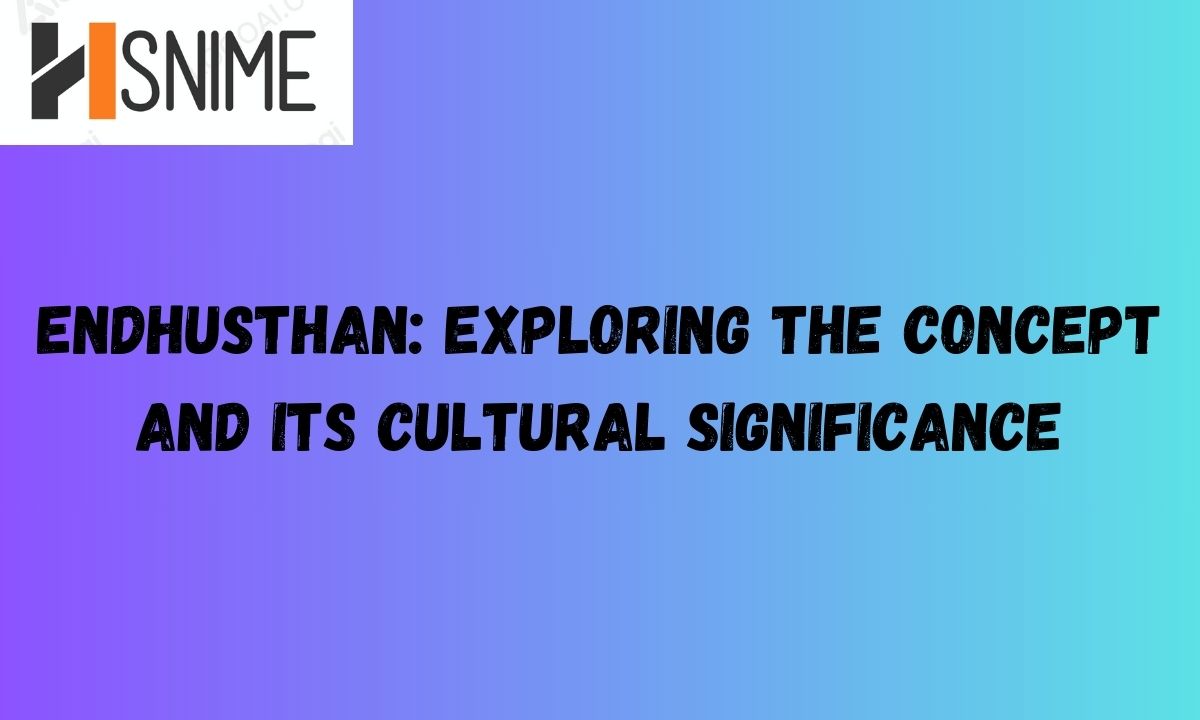Introduction of Endhusthan
We are living in a fast-paced society, and therefore not everyone knows what the term “Endhusthan” means. Yet, when we try to find out what it means and how it is viewed in the cultures. We discover that it has much to tell us about history, ethnicity, and contemporary perceptions.
What Is Endhusthan?
Endhusthan is often viewed as a conceptual representation of the Indian subcontinent, rooted in the ancient past. The word combines “End” and “Husthan,” both symbolic in their ways. The “End” can signify completion, while “Husthan” relates to the land. Or region, commonly used in ancient terminologies in the region. While the term may not have been widely used in historical documents, it hints at a blend of cultural ideologies.
Historical Interpretations
Despite the absence of the term “Endhusthan” in the traditional sources, this term can act as the conceptual synthesis of historical and philosophical legacy. India which is also referred to as “Bharat “or Hindustan has always had many names according to certain regional or foreign impact. Endhusthan may represent the historical pinnacle or ripening of a region that for thousands of years has been progressing.
This idea resonates when we think of the many layers of Indian history: In India, chronologically. It goes through the Indus Valley Civilization, The Mughal Empire, The British Empire, and finally, India got its independence. In each period, the subcontinent evolved or developed, and the impressions that came out of it can still be seen today.
Endhusthan in Modern Culture
In current scenarios, Endhusthan may well embody all these various strands. India today combines small villages with tens of thousands of years of history. And megacities with all the high-tech gizmo that one can imagine, abstract spirituality with a burgeoning economy. In this light, the concept of Endhusthan could be interpreted as a fact. The country has come a long way from being the initial civilization to becoming the contemporary cultural, technological, and political giant.
Besides, in some contexts, Endhusthan can become a term referring to some future India, in which the ‘end’ does not mean an ending but a culmination. This is characteristic of a society where both the young and the elderly are embraced. And where the conventional and the contemporary are in union.
Endhusthan and Indian Identity
Identity plays a crucial role in any discussion about a nation or concept like Endhusthan. Over time, India’s identity has shifted through various influences, but the core remains strong. Ancient philosophies, religions, and languages continue to shape modern Indian culture. Terms like It help reflect this dynamic, showcasing the nation’s ability to adapt and grow while remaining true to its roots.
In a country of over a billion people, identity is not just singular but collective. Endhusthan could signify that collective consciousness, representing the country’s unity despite its vast diversity.
Cultural Legacy
The research on Indian culture carried across generations has attracted the interest of scholars all over the world. With various forms of Yoga, music, food, dance, festivals, and everything else you could think about, Indians have it all. This diverse yet unified ethos might be well-expressed through the idea of Endhusthan, a culmination of thousands of years of history, culture, and knowledge.
This imagined concept serves as a reminder that India’s cultural legacy is not static. Like the flowing rivers of the land, it moves, and changes. And adapts, influencing the world while remaining firmly rooted in its origins.
Why Does Endhusthan Matter?
In today’s world, where globalization has made borders more fluid, ideas like Endhusthan are more relevant than ever. It gives us a lens to understand the complex layers of Indian identity. It’s not just a land but a symbol of resilience, adaptability, and growth. It serves as a metaphorical anchor for a nation that has constantly evolved yet remains grounded in its rich history.
Conclusion
Endhusthan is not just a word but a concept where you can begin to understand the history, the culture, the people, and the development of the Indian subcontinent. The term may not be seen reflected in archival incontrovertible evidence. However the concept could be used as a key to look at the Indian narrative. Over the years It transformed from a historical, exotic, and cultural site to one of the leaders in the fields of innovations, sciences, and arts.
FAQ’s
What does Endhusthan mean?
This is a conceptual term representing the Indian subcontinent and its cultural evolution.
Is Endhusthan a historical name for India?
No, it is a modern interpretation and not found in historical texts.
What is the significance of Endhusthan?
It symbolizes the fusion of India’s ancient history and modern advancements.
Why is Endhusthan relevant today?
It reflects India’s dynamic identity in the globalized world.
Does Endhusthan refer to any specific region?
It broadly represents the Indian subcontinent, rather than any specific region.
Is Endhusthan used in cultural discussions?
It can be used to describe India’s rich cultural legacy and evolving identity.











4 thoughts on “Endhusthan: Exploring the Concept and Its Cultural Significance”